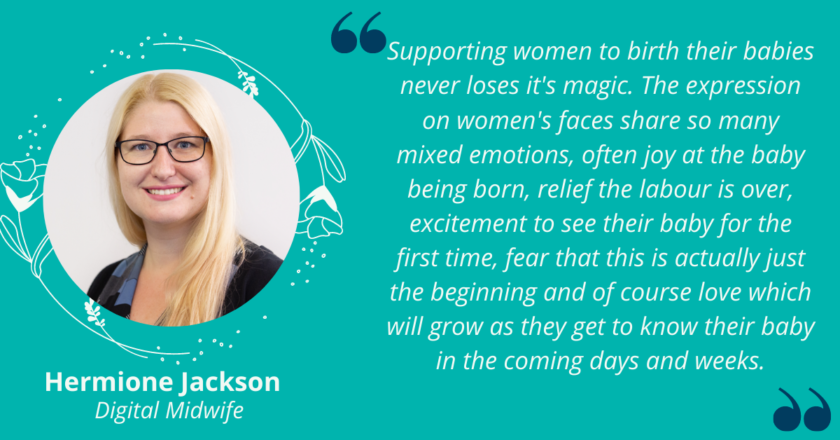
This Mother’s Day we are celebrating our midwives, the lifeblood of any journey into motherhood.
Digital Midwife Hermione Jackson (pictured below) is currently half-way through her Digital Leadership Scholarship and is already seeing the benefits of our programme. Hermione is Lead Digital Midwife Advisor at the Royal College of Midwives, where she is applying the work from her RCM supported FNF scholarship.

Hermione tells us that, “supporting women to birth their babies never loses its magic. The expression on women’s faces share so many mixed emotions, often joy at the baby being born, relief the labour is over, excitement to see their baby for the first time, fear that this is actually just the beginning and of course love which will grow as they get to know their baby in the coming days and weeks.”
The COVID-19 pandemic has resulted in many NHS health services being paused. The way in which patient care was provided changed but babies are still being born and mothers still need vital care. Midwifery care hasn’t stopped. Maternity services introduced remote online care, allowing expectant mothers to have one-on-one appointment virtually with their midwife from their own home. This allows partners to still be present and expectant mothers to get know their midwife, without a mask.
Hermione tells us that “at the start of the pandemic we had to make some very difficult changes, the hardest of which for many midwives was the temporary suspension of our homebirth services. Supporting women to have their baby at home is really important and it was very difficult to be unable to provide that service safely during the pandemic. Thankfully that service has been able to resume, and women can choose to birth at home now supported by a midwife if they would like to. It was great during the pandemic to see how adaptable staff were to the need for rapid changes. Staff were very supportive of each other and really rallied to provide the best possible care in the most challenging circumstances.”
“We prioritised that women had a birth partner present during active labour. For scans women could use their phone to take videos/pictures of the scan images and use video call to include the partner for a portion of the scan. Virtual antenatal appointments also allowed women to have their partner present, this was particularly useful for the appointments were we discuss preparing for birth.”
Thanks to FNF, Hermione was able to use skills she had developed on her scholarship programme. Her resilience was tested and she was able to cope with the unknown demands of COVID-19 on fellow midwives and expectant mothers:
“FNF has helped me to grow as a leader, the courses allowed me to reflect on myself, my experiences working in the NHS and how I wanted to develop myself going forward. It has also allowed me to connect with other leaders both at my level and those working in roles I would aspire to be in.”